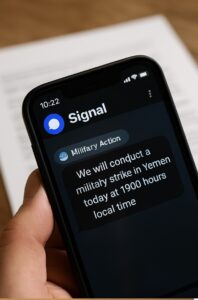A significant national security incident unfolded this week when Defense Secretary Pete Hegseth reportedly shared classified details about a military operation in Yemen through an unsecured Signal group chat. The information was inadvertently exposed to journalist Jeffrey Goldberg of The Atlantic, who had been mistakenly included in the conversation.
The breach, described by officials as unintentional but serious, has prompted a swift and bipartisan response from lawmakers. Members of both political parties are calling for a full investigation and, in some cases, for Hegseth’s resignation.
While initial statements from the Department of Defense emphasized that no troops were directly endangered, concerns remain about the precedent and potential vulnerability such an incident poses, particularly at a time of heightened global tensions.
What Happened?
According to sources familiar with the exchange, Secretary Hegseth used the encrypted messaging app Signal to coordinate strategic details related to the Yemen strike with several high-level advisors. Due to what’s being described as a contact list error or unauthorized access, the chat also included Goldberg, who reportedly received sensitive updates in real time.
Upon realizing the mistake, officials quickly removed Goldberg from the group and initiated an internal security audit. Goldberg has since confirmed that he did not publish the contents of the chat and immediately notified authorities.
A Cautionary Tale in the Digital Age
Though the breach appears accidental, it serves as a reminder of the increasing challenges associated with digital communication and information security at the highest levels of government. Apps like Signal are praised for encryption but are still vulnerable to user error.
“This underscores the need for stricter digital protocols and secure communication training, even among top officials,” said a cybersecurity analyst at the Center for Strategic and International Studies.
Broader Implications and a Path Forward
The incident has sparked conversations not just about accountability, but also about how leaders communicate sensitive information in an age where encryption, cloud syncing, and instant messaging blur traditional boundaries.
Experts suggest this could be a turning point in how classified operations are coordinated, potentially leading to policy reforms around mobile communications and digital chain-of-command.
Lessons to Learn
While the event has understandably drawn scrutiny, it also offers a timely lesson: even the most secure tools are only as effective as the people using them. In today’s fast-paced, tech-driven environment, double-checking digital details isn’t just good practice—it’s essential.
In the words of one bipartisan statement issued from the Senate Armed Services Committee, “This incident reveals a gap in judgment, not necessarily a flaw in tools. But it is a gap that must be addressed swiftly and transparently.”
As investigations continue, the administration has pledged full cooperation. In the meantime, public discussion has begun to shift from blame to solutions—a hopeful sign that even in moments of misstep, there is room for constructive change.
Sources: The Guardian, [NPR], [Reuters]
